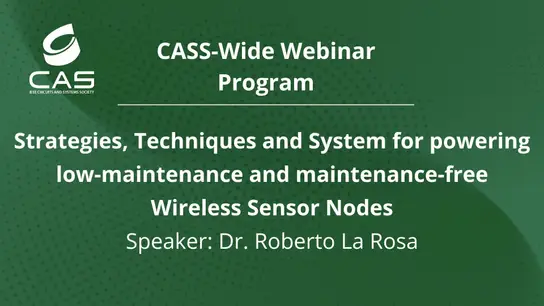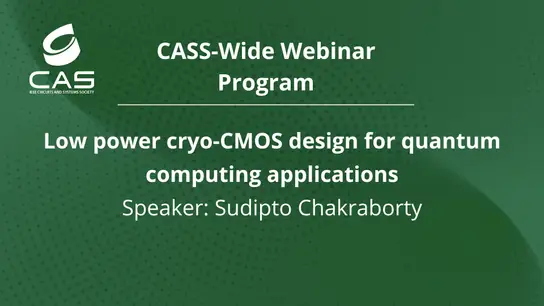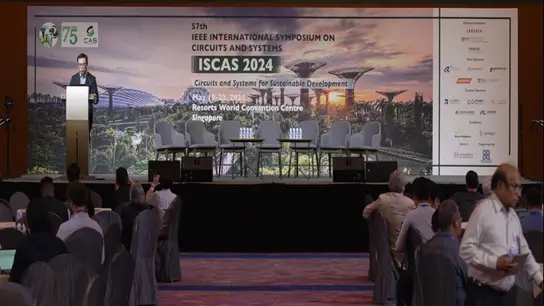Artificially-Intelligent Closed-Loop Neurostimulators for the Treatment of Neurological Disorders
Roman Genov
-
Members: Free
IEEE Members: Free
Non-members: FreeLength: 00:54:58
20 Oct 2023
Abstract: The rapid advancements in artificial intelligence and neuroscience have led to ground-breaking innovations in the field of medical devices, particularly in the development of artificially-intelligent closed-loop neurostimulators. This plenary talk delves into the transformative potential of these neurostimulators, highlighting their ability to revolutionize healthcare by offering personalized and precise therapeutic interventions for a range of neurological disorders.
Neurological disorders, such as epilepsy, paralysis and chronic pain, have a profound impact on the quality of life for millions worldwide. Traditional treatments often involve generalized interventions that do not adapt to the specific patient or their changing condition. Artificially-intelligent closed-loop neurostimulators have emerged as an effective solution that harnesses the power of machine learning to provide real-time monitoring, analysis, and responsive stimulation tailored to an individual's neural activity patterns.
This talk will explore the technical implementations of these neurostimulators, deployed both in the central and in the peripheral nervous systems. Such neurostimulators integrate neural sensing technologies, energy-efficient machine learning algorithms, and adaptive stimulation delivery paradigms. By continuously monitoring the neural electrical activity, these devices can swiftly detect abnormalities or fluctuations, enabling timely adjustments to the stimulation parameters. This closed-loop approach ensures that therapy adapts optimally to each specific patient and remains effective as the patient's condition evolves over time.
As we stand at the cusp of a new era in healthcare, the potential of artificially-intelligent closed-loop neurostimulators to transform patient outcomes is undeniable. This plenary talk will not only highlight the scientific and technological advancements behind these devices but will also emphasize their broader implications for reshaping medical practice. By embracing the convergence of artificial intelligence and neuroscience, we have the opportunity to unlock a future where personalized, adaptable, and effective therapies become the cornerstone of neurological disorder treatments.
Biography: Roman Genov received the B.S. degree in Electrical Engineering from Rochester Institute of Technology, NY in 1996 and the M.S.E. and Ph.D. degrees in Electrical and Computer Engineering from Johns Hopkins University, Baltimore, MD in 1998 and 2003 respectively.
He is currently a Professor in the Department of Electrical and Computer Engineering at the University of Toronto, Canada, where he is the Director of Intelligent Sensory Microsystems Laboratory and a member of Electronics Group and Biomedical Engineering Group. Dr. Genov’s research interests are primarily in analog and digital integrated circuits and systems for energy-constrained biomedical and consumer sensory applications, such as implantable neural interfaces and computational image sensors.
Dr. Genov is a co-recipient of Jack Kilby Award for Outstanding Student Paper at IEEE International Solid-State Circuits Conference, Best Paper Award of IEEE TRANSACTIONS ON BIOMEDICAL CIRCUITS AND SYSTEMS, Best Paper Award of IEEE Biomedical Circuits and Systems Conference, Best Student Paper Award of IEEE International Symposium on Circuits and Systems, Best Paper Award of IEEE Circuits and Systems Society Sensory Systems Technical Committee, Best Paper Award of IEEE Circuits and Systems Society Biomedical Circuits and Systems Technical Committee, GlobalFoundries Micro-Nanosystems Design Award, Award for Excellence in Microsystems Design Methodology, Brian L. Barge Award for Excellence in Microsystems Integration, MEMSCAP Microsystems Design Award, DALSA Corporation Award for Excellence in Microsystems Innovation, and Canadian Institutes of Health Research Next Generation Award. He has served as a Technical Program Co-chair at IEEE Biomedical Circuits and Systems Conference, a member of IEEE International Solid-State Circuits Conference International Program Committee, and a member of IEEE European Solid-State Circuits Conference Technical Program Committee. He was also an Associate Editor of IEEE TRANSACTIONS ON CIRCUITS AND SYSTEMS-II: EXPRESS BRIEFS and IEEE SIGNAL PROCESSING LETTERS, as well as a Guest Editor for IEEE JOURNAL OF SOLID-STATE CIRCUITS. Currently he is an Associate Editor of IEEE TRANSACTIONS ON BIOMEDICAL CIRCUITS AND SYSTEMS.


